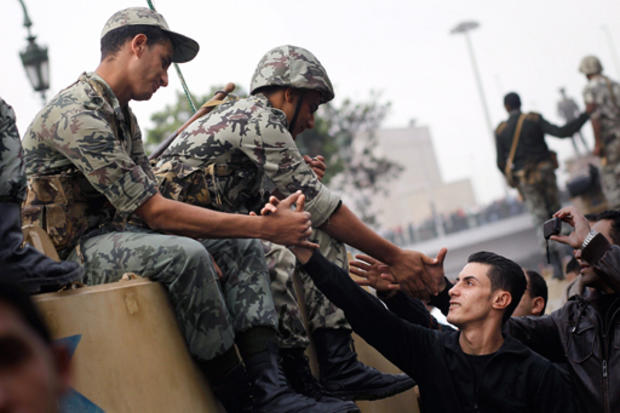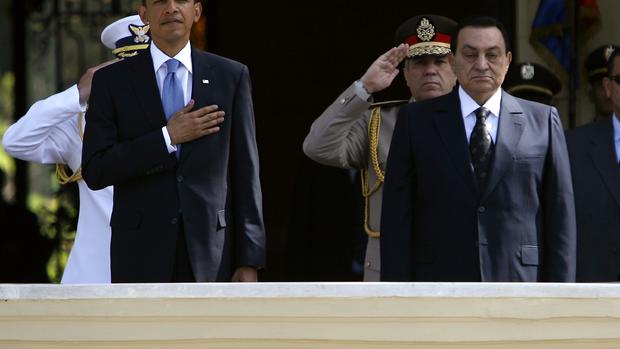U.S., U.N. Wrestles with Response to Egypt Crisis
With protests building toward a million-person demonstration and a general strike called for this week, the Obama administration is trying to show support for a pro-democracy movement in Egypt without appearing to be pushing out longtime U.S. ally, Egyptian President Hosni Mubarak.
Live Blog: Egypt in Crisis, Day 7
Day Six coverage of Egypt in Crisis
Both Mr. Obama and Secretary of State Hillary Clinton are dealing with the great unknown -- that is, what will happen next in Egypt -- and hoping for a peaceful and orderly transition.
The State of the Union was supposed to be about domestic issues only: jobs. But it was not - because jobs depend on competitiveness and currency in China and India, free trade with U.S. partners and international stability. With almost two million barrels of oil a day passing through the Suez Canal, there are also economic interests at stake in Egypt, not to mention the 52,000 Americans -- whom the State Department has begun to evacuate.
Both the president and the secretary of state are consulting U.S. partners around the world and beginning to talk of "transition." There are those who say the U.S. is not doing enough and others who question if the moderate protests could launch a radical regime. The former Director General of the International Atomic Energy Agency (IAEA) and Nobel laureate, Dr. Mohamed ElBaradei told Bob Schieffer on Face the Nation, "You have to stop the life support to the dictator. You are losing credibility by the day."
Mr. Obama is not the only one trying to stay on the sidelines of the fray. Presidential statements against violence often emanate from the U.N. Security Council. But the U.N. seems a bit tongue-tied on the Egypt crisis - even with decades of Middle East dealings under its belt. Comments have been made by the U.N. Secretary General and the human rights chief but the U.N. Security Council has not acted. U.N. High Commissioner for Human Rights Navi Pillay urged Mubarak to exercise restraint, and to initiate investigations into reports of the use of excessive force.
White House: We're Not Taking Sides in EgyptEgypt Army: We Recognize Legitimacy of Protests
The U.N. may have a role to play, but with most world leaders in Davos, Switzerland and later in Addis Ababa, when the protests began in Egypt, neither the Security Council nor other relevant U.N. agencies have acted.
This week, at the sidelines of an African Union Summit in Addis Ababa, U.N. Secretary General Ban Ki-moon, said, "I have been repeatedly saying that the leaders of any country, including Egypt, should first of all listen attentively, most sincerely, to the voices of people. What are their genuine aspirations? What do they want? And they have a broad responsibility, first of all, to provide decent jobs and good opportunities to maintain a decent living."
But why not more? U.N. involvement in the Middle East has been active for six decades and four wars. The United Nations Truce Supervision Organization (UNTSO), was created in 1948 to supervise the truce called for by the Security Council in Palestine. Its first peacekeeping force was established during the Suez Canal crisis of 1956 and U.N. Security Council Resolution 242 was passed in 1967 in the aftermath of the Six Day War, and the Council's Resolution 338 established the cease-fire at the end of the Yom Kippur War in 1973.
At left: Washington's Unplugged roundtable on the crisis with CBS News chief White House correspondent Chip Reid, national security correspondent David Martin, veteran State Department reporter/producer Charlie Wolfson and Council on Foreign Relations' Robert Danin.
In addition, there has have been looting of Egyptian antiquities. "These treasures must be returned back and the law must be enforced here," said Saadawi, "the U.N. and UNESCO should dedicate resources to identify and return these lost treasures."
The crisis in Egypt is volatile and no one can say - neither the Obama administration nor the U.N. - how this revolution ends. But the U.S. and the U.N. (which have both been so involved in the Middle East) could weigh in -- without taking a position on the end result - during the path along the way.
Pamela Falk is a CBS News foreign affairs analyst based at United Nations Headquarters.


